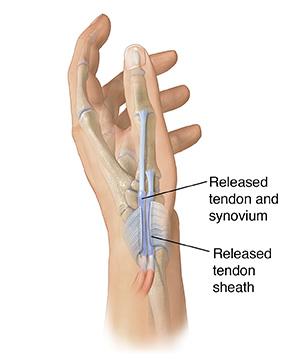Treating De Quervain Tenosynovitis
The goal of your treatment is to ease your pain and allow you to use your thumb again. Treatment will depend on how bad the pain is.
Nonsurgical Treatment
Just taking a break from the activities that caused your pain may be enough. Your healthcare provider may also have you take nonsteroidal, anti-inflammatory drugs, such as ibuprofen. You may also wear a splint for a few weeks to rest the thumb and wrist. To ease swelling, your healthcare provider may inject an anti-inflammatory medicine, such as cortisone around the tendons. You may have more pain at first. But in a few days your thumb should feel better.
Surgery
If other kinds of treatment don’t ease your pain, or if the pain is bad, you may need surgery. The sheath that surrounds the tendons is released so the tendons can move more easily. This helps reduce the inflammation. It also allows you to straighten your thumb without pain. Surgery is done with local or regional anesthetic on an outpatient basis. So you can go home the same day. You will likely have a splint or dressing on your wrist for a few days while the tissue heals. You may need physical therapy to help make the muscles strong. Your healthcare provider will talk with you about the risks and possible complications of surgery.
 |
| The surgery releases the protective sheath, creating more space for the tendons. This allows them to move more freely and relieves inflammation. |
© 2000-2025 The StayWell Company, LLC. All rights reserved. This information is not intended as a substitute for professional medical care. Always follow your healthcare professional's instructions.